What Can We Learn from a Lobster?
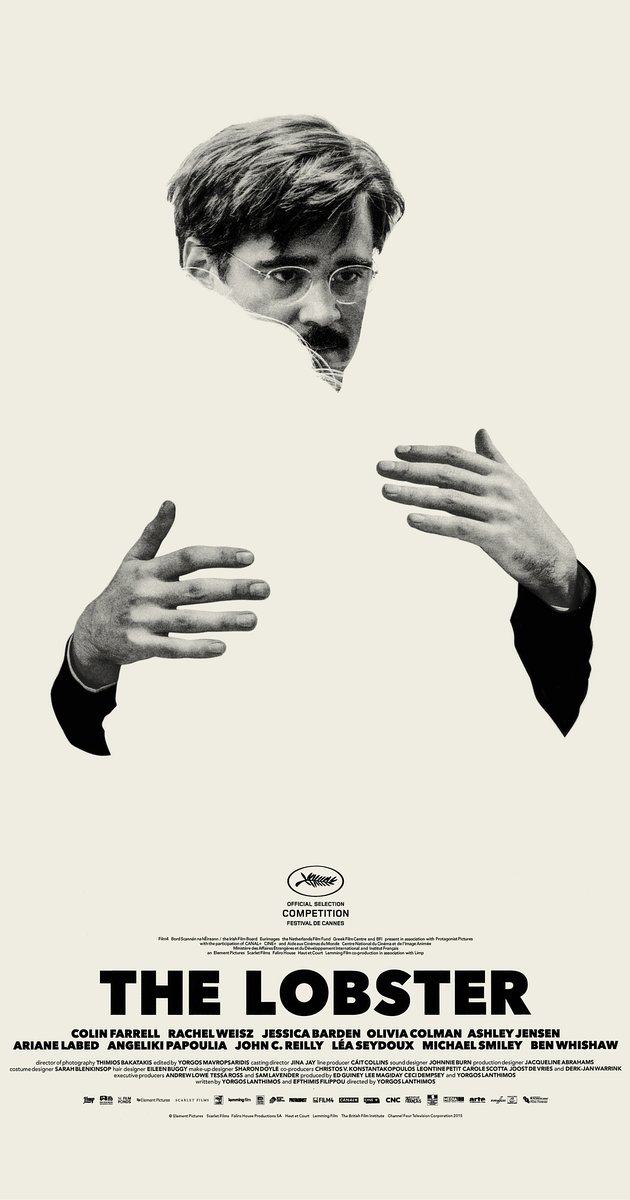
The film The Lobster came out in 2015. It is a dystopian comedy-drama following the romantic struggles of David, a middle aged man searching for affection in a cold world.” It’s evident from the narrator’s introduction of the protagonist that the movie isn’t aiming to evoke any overly emotional responses. The movie utilizes a dry dark humor. The simplicity of characters’ desensitized reactions might not make viewers weep or laugh, but they certainly leave room for analysis. The Lobster is a demonstration of the effects of an oppressive society that can teach viewers about the possibility of devolution as a consequence of governments which pursue social manipulation.
The Premise
Single people are herded off to a hotel and given 45 days in which to find a mate or be turned into an animal. The hotel is designed to help condition people and force them into accepting that it is better to comply and be part of a couple as a functioning member of society than to be an unwanted single person. It’s a premise silly enough to trick viewers into thinking “that could never happen in real life” so the realization “maybe it could” is more jarring once the movie progresses.
Why Animals?
Is there a reason they’ve adopted such an extreme and laborious process? “Very few people pick unusual animals which is why they’re endangered,” explains the Hotel Manager. Is it a means of repopulating dying species? Well, no. If their society has the technology to put human organs in an animal’s body (of any size) it would be reasonable to believe they have that DNA on hand, completely capable of cloning or breeding more should the need arise.
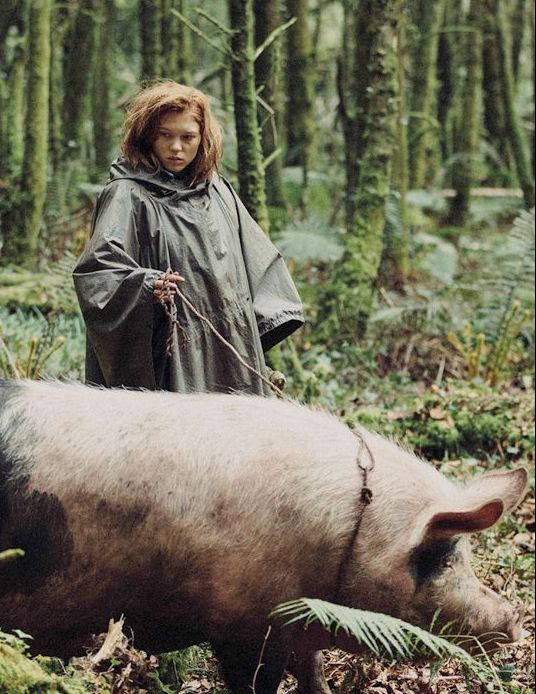
It’s mentioned by the character John that all the human blood is donated to hospitals after the transformation. Is it all due to a sorely lacking need for blood donors? Again, it would be odd to assume that with the technology to turn a human into an elephant, they are without the necessary medical technologies to easily treat patients. Realistically, turning someone into an elephant is a much larger waste of blood and organs than what would be sent to the human hospitals post-surgery.
All other options aside, perhaps this practice is a form of population control. Why not just outright kill those who don’t make the cut? By the responses of some characters in the movie it’s assumed that turning people into animals is an easier way of accepting the forced termination of their family. David continues to love his brother after he’s been turned into a dog. Their society is a machine: emotionless and not interested in real individuality (people only appear to have interests so long as they are accepted useful or traditional skills as well as benign quirks). The system needs to rid itself of ineffective components; that’s what it would have it’s people believe anyways. “It’s for the greater good,” is likely what people tell themselves every time a loved one is carted off and re-bodied. The surgery is promoted as a second chance at life to ease people’s fears.
The Lobster adds depth to its premise by showing that many characters in the movie express various degrees of reluctance towards the practices of their system. But they go along with it, because it’s not about what they feel is right, it’s about what they’re told is right. John asks David, “What’s worse: to die of cold and hunger in the woods, to be killed or eaten by some bigger animal or to have a nosebleed from time to time?” They both agree the answer is to be turned into an animal.
People trust society is doing things for a greater purpose; that’s what authority is for, right? Wrong. Dystopias love to focus on exposing corrupt systems and The Lobster follows that trend. “Population control” wasn’t just referring to the amount of people in their world. Turning people into animals controls the population through brainwashing because the fear their system instills keeps individuals oppressed and compliant.
The System
It becomes obvious that turning people into animals is foremost a manipulation tactic when considering the lack of initiative given to eradicating the loners. Clearly being a loner isn’t strictly illegal. Authorities scan for signs of loners so they may not reap the benefits of inner city life and will punish them if found, but other than that loners are free to be loners. Although they hide in forests, loners are not off-the-grid. The hotel knows where they are and routinely sends guests out to hunt them. If a guest captures a loner they are awarded extra days to stay at the hotel. If being a loner was truly unforgivable, wouldn’t the authorities actively go out and exterminate them? They know where to find them. This doesn’t happen because loners are a calculated part of law abiding citizens’ manipulation into compliance. Loners need to exist to serve as a deterrent for wanting to rebel against their system of coupling-up. Loners help further the system’s agenda.
Conditioning
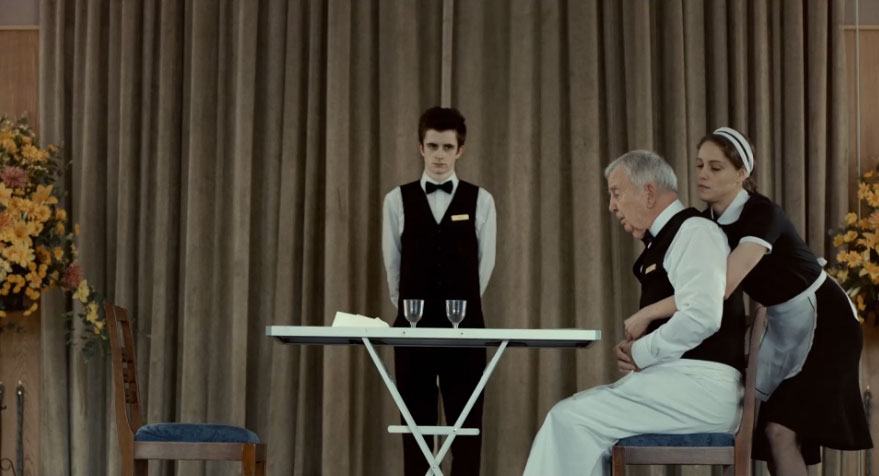
Why does their society’s conditioning work although the premise seems nonsensical? Well, anything sounds good so long as it’s backed by seemingly logical arguments. The hotel restrains new guests in handcuffs to show them how much easier life is with two of something because they “tend to forget that sometimes.” They present their rationale for forcibly coupling people as statistically undeniable in creating an enhanced lifestyle. Ill acted skits are performed to solidify the necessity of being with someone at all times— one could die choking on food or get raped if they are alone!
The Hotel Manager acts as if it is a fact that being turned into an animal “is not something that should upset [people or] get [them] down.” She poses that “as an animal [one will] get a second chance to find a companion,” as if it’s granting a second life, not terminating the first one. The hotel even stresses the nonsensical argument that guests need to find a companion of a similar animal post-surgery because “a wolf and a penguin could never live together, nor could a camel and a hippopotamus. That would be absurd.” (A quote asserting why couples as humans need to be compatible rather than just in love in it’s undertone.) People raised in this black and white conditioning can’t see the fault in their society’s logic for enforcing such a ridiculous practice because it’s arguably the best option (based off what they know to be “options”). An elitist mentality would rationalize that not being able to fit into society proves someone is metaphorically already an animal, the surgery just makes it official.
The Loners

When people don’t agree with or fit into society they either accept becoming a loner or an animal (or both). There is no other alternative shown. What solidifies The Lobster as a beautiful display of oppression is its depiction of the loners as paralleling the hotel’s strict rules. Viewers see that the loners are not, by our standards, free. They have escaped the enforcement of one strict set of rules for another.
If one chooses to be a loner, that is what they must be by definition. The term is not used as a means of asserting their ostracism; those are the conditions of their hermit society. Members of the group may not socialize freely. Getting too close to someone is frowned upon and any sexual acts are completely prohibited. When David arrives at the camp he meets a man who was punished by having his lips slashed with razors, just because he was caught flirting. Loners embody the extreme opposite of city dwellers: Isolation is enforced.
If one wants to express themselves physically they are given a player and earbuds with which to listen to music alone and dance alone, or masturbate. This would seem like just a counter measure to make sure no seduction occurs, but it’s more than that. Although the leader hugs David to welcome him into the camp, it’s a formality, and no hugs in the movie are shown as a two-sided act. Lengthy platonic relationships are risky. People aren’t seen actively indulging in friendships because they are scared others might accidentally take it as a romantic relationship and that’s against the loners’ code. Upon entering the group, everyone is expected to dig their own grave. You would think a radical group rejecting the forced coupling and de-bodiment of people would encourage compassion over society’s black and white outlook, but the loners are bound by survival of the fittest. When a man gets his leg caught in a trap the group simply watches him scream and bleed and coldly wish him luck finding his way to his grave. If they were truly enlightened they would help him, as a family, but their leader’s rejection of the hotel’s lifestyle leads to another kind of tyranny.
The Loner Revolution
The loners storm the hotel one night in what they deem a rebellion. They aim to “expose” what a fraud the couples at the hotel are— two people paired together over frivolous quarks, just trying not to be turned into animals. They aim to prove that the couples don’t love each other. The problem with their revolution is that it’s not to wake people up to the possibility of free expression, it’s merely to try and impose their own ideals. They are not debunking the hotel’s preaching by revealing a better kind of love (unconditional love not based on suitability), they are aiming to destroy the idea love exists at all. The Leader wants to enforce the idea that the hotel guests are lying to themselves, but asserts that the answer to their shattered paradigm is believing they are better off alone. Everyone in the entire movie IS lying to themselves, they just don’t have the answers or foresight to see it like viewers do. The loners believe only in self-love and ironically reject spontaneous, genuine, unconditional love for others (much like the rest of society).
Why the System Works
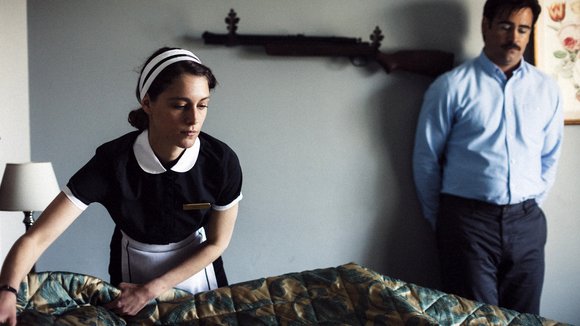
Showcasing a society sustaining the hotel and the loners, The Lobster is a movie which brilliantly displays oppression. This is what oppression looks like; it permeates all aspects of society. The loners might seem absurd but the truth of the matter is, they don’t know better. Having been raised in accepted society (as the leader of the loners is shown to have been, visiting her compliant parents often while still hiding her lifestyle), the loners have never seen other forms of relationships. They don’t reject society by accepting genuine love and happiness because they can’t conceptualize what true love is. They don’t have the language to express what they feel therefor they can not create proper thoughts of rebellion, let alone act on one themselves.
Think of the classic dystopian novel 1984. The Party controlled people in society in many ways but one such tactic was Newspeak. The government actively worked to deteriorate society’s language to a point where people wouldn’t have the vocabulary to communicate any thoughts of descent. The Lobster works in much the same way but it’s society destroyed people’s means of expression.
Meaningful conversations were cut away and simplified until it was so uncommon to display abundant emotions it became taboo. They’ve devolved into only dealing in socially distant and awkward exchanges. This is seen in the lack of substance in the conversations people have. They’re stanch, polite, and bland. No one speaks passionately about anything. In the family dinner scene with John, his partner and their designated child, what passes for interesting conversation is discussing various sports’ ball sizes— ie. nothing personal. Characters don’t talk about their feelings with emotion or for any long amount of time. A good example of people’s unwavering conditioning is David saying “that’s awful,” in response to his mandatory stimulation at the hotel, but he lies back and subjects himself to it all the same. People have become compliant even when faced with doing something they hate; How can people have an illuminating conversation when there is no one to talk to or bounce ideas off of?
Their Concept of Love
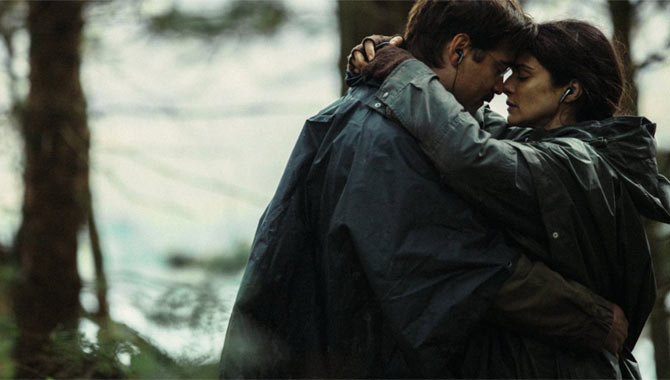
Their society has deteriorated the concept of love and mutated it into meaning “suitability.” While we may see love as wild and spontaneous, they see love as needing to make sense, thus killing people’s ability to feel compassion or unconditional affection. David’s wife leaves him only for someone better who also wears glasses. John’s father left his mother to be with someone better at math. Their reasoning for relationships feels hollow. Society has effectively eliminated free will (in terms of social choices), perhaps trying to take the randomness out of human behavior. If they’re going to be erratic, they might as well be animals.
People find mates which share their “defining characteristic.” This is not to say people don’t have preferences. David likes accents and short hair, but those are things which can be faked or lied about. People are so scared of being turned into animals they aren’t willing to risk trying to find a partner who doesn’t share a suitable quirk, because being exposed as trying to cheat the system results in an automatic re-bodying into the “animal no one wants to be.”
An example of how restrictive their idea of love is can best be seen through John. It would be reasonable to fall for John by sympathizing over the story he tells of losing his mother. He was so desperate to see her again once she’d been turned into an animal that he entered a wolf pen at a zoo to try and get a hug from her, which resulted in his leg being so badly injured he will always limp. Unfortunately finding someone attractive isn’t enough. John actively searches for someone with a limp but feeling the pressures of his imposing deadline, opts to continually force his nose to bleed thus effectively pretending to share that trait with a pretty girl.
People have been basing their relationships on finding suitability over true compatibility for so long, they have little idea what love could be above that, aside from raw physical attraction (and then, being an animal could fulfill one’s lust well enough instead). At the beginning it’s said “[David] didn’t think that the first thing most people do when they realize someone doesn’t love them anymore is cry.” Clearly a sense of loss is not thought to be associated with lost relationships, because they are not based on genuine love to begin with. If anything, losing his wife was just a life-threatening inconvenience.
The Ending
Why is the movie called The Lobster? David picks a lobster as the animal he’d like to become and gives the reasons that they live long, stay fertile all their lives, are blue-blooded, and he’s always liked the sea; but if you’ve ever watched Friends it’s a common saying that lobsters pick a partner for life. Perhaps the movie aimed to play on that phrase. David wants something more sustainable than the hollow relationships he’s been conditioned to think are ideal his whole life. It’s likely he cared for his ex-wife only to realize she was biding her time to find someone better.
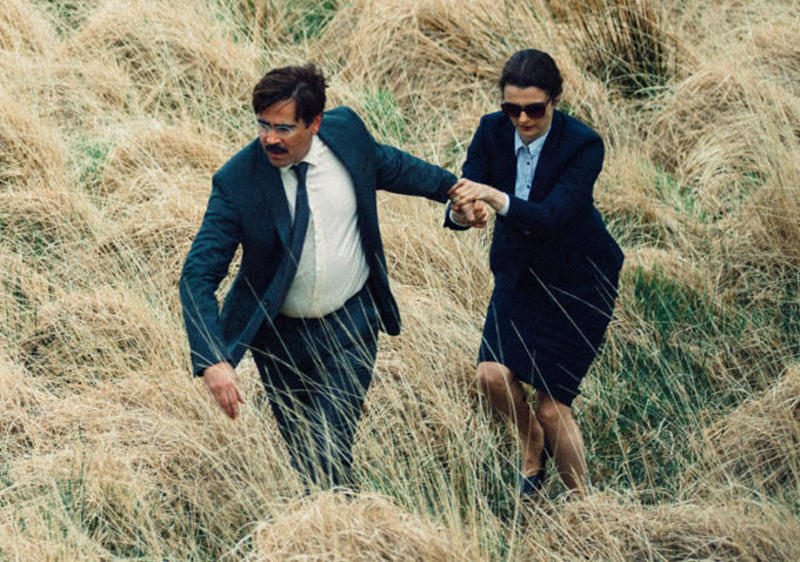
When Short-sighted Woman is blinded, David almost loses hope of being with her. They try over and over to find a similarity but can come up with nothing. Uncharacteristic to other members of society, David doesn’t abandon ship and find someone more convenient. He decides to “make it work” and run off with her. Despite never having heard of unconditional love, David is the first to display it.
David is the character closest to enlightenment but the movie leaves us with the ultimate question of whether David is capable of seeing “love” as something beyond suitability, or a strong emotion which still requires it. David’s decision to forsake the loners and return to the city to be with her is noble, and his willingness to blind himself for love seems like a sort of redemption, but does he blind himself because he still doesn’t know better or because he needs to play to their system? The movie leaves us with a cliffhanger, whether we choose to believe David blinded himself or not.
What motivates David into blinding himself? Has he gotten over the fixation he’s shown the whole film about prioritizing having eyesight similarity with his romantic interest or is he indulging it? Blinding himself seems like something that would only be done in the name of true love, but in these circumstances it could simply be David’s conditioning shining through as this is the only means he has to return to society. No matter the scale of David’s revelation, he’ll have to continue to live within the system if they want to be a couple so he has to force suitability upon himself either way. There’s no winning for David, enlightened or not; he’s alone with eyesight or coupled and blind.
If anything, viewers should come away from watching The Lobster with a better understanding of what oppression inflicts on its people. So individuality isn’t shunned and people aren’t desensitized or brainwashed, it’s important that we always embrace freedom of expression and question the validity of our government’s practices. Let David serve as a warning. If people let society get too out of hand, by the time someone is able to rise above their conditioning, things could be too far gone to ever go back or offer an alternative lifestyle. Let’s not leave future freedom fighters in an impossible position; say NO to turning people into animals.
What do you think? Leave a comment.











Great article from an unusual movie. We need more movies like this!
I imagine the only reason this was made was due to the very quirky script that attracted Colin Farrell and Rachel Weisz.
I felt like it lost focus and went in a direction it didn’t need to go to make its point. My interest started to wane as the movie went on and I saw where it was going. What was fun about the early sequences is you start to learn the rules of this world bit by bit as it unfolds.
I also find the rule learning of various odd societies in literature/film fun and The Lobster definitely prompted a “wait… are you serious?” reaction.
Lovely analysis. This film is a breath of fresh air amidst recent titles I’ve seen.
Thank you for this article. I began watching the movie and lost interest, I will try it again now that I have read your piece. Thanks
What a lovely article! I have not yet watched the movie, yet it’s been on my to-watch list. (Luckily, spoilers rarely prevent me from enjoying movies or books.) This movie kind of flew under the radar for me and I didn’t give it much thought, amongst all the blockbuster and buzzing Oscar winners. But the premise, as you have described it here, is incredibly fascinating and your analysis uncovers some marvelous themes and touches upon issues that really made me think, even without watching it. Definitely watching this movie at the earliest opportunity!
I think it was nominated for an oscar last year. The director is a strange chap btw. You should check out hs previous works as well, but those aren’t light-hearted even in appearance.
good insight
good insight, really like the video
I haven’t watched such a well-made black comedy in years.
I get that this film is a satire about finding true love, including a host of other interesting ethical questions, but in doing so it tries to be as off-putting as possible, as if to say “only smart people will make it through this film.”
There were elements on this movie that did not need to be in it.
The Lobster among many other movies of it’s genre resemble certain books you’d read in highschool where the last pages were the most relevant and wading through everything else to get there felt tedious. That strategy of presentation is definitely less successful in film because viewers would rather click it off once they get bored, and even then, there are certain parts that are still arguably unnecessary (not just because of the boredom factor). I see what your saying but also found myself enjoying the extra length, it made me literally feel as bored in some parts as I would be if dealing with such bland characters in real life haha.
This would have made a good ‘Black Mirror’ episode.
A thinkers movie.
The plot is similar to “The Anti-Christ” where setting and dialogue are sparse and forceful.
John C. Reiley should be in every film being made.
Slaidey certainly chose an interesting film from which to work. While forced social control, ala *1984,* is a reasonable interpretation, I viewed *The Lobster* in light of declining populations in several first or global north nations, including in recent years Japan and Germany. Slaidey’s read that the film leverages contemporary relationship fragmentation against statehood is bolstered by the strange outcomes of state policies on relationships (e.g., China’s one-child policy creating a wild gender imbalance or anti-abortion laws in the US tipping full-term pregnancies and childbirth disproportionately to the poor) and by other dystopian treatments of modern relationships, from 2010’s *Catfish* to 2013’s *Her* to 2015’s *Ex Machina.* Again, smart work from Slaidey.
Like a mix of Von Trier and Wes Anderson!
The real question is why are loners ostracised and why is there such pressure on finding partners? In the real world, I mean.
I see you had more of a real world interpretation of the social structure, just like David, people in North America are expected to settle down after college. It’s a good thing people seem to be heading away from the rigidity of The Lobster’s bleak social system and becoming more inclusive of all lifestyle choices. The commentary on current social ostracism and relationship expectations is very important and relevant.
Fantastic analysis of a fantastic film.
I’m not usually a fan of dystopian films, but this one reminded me more of 1984 than anything else I’ve seen.
GREEEAT article! People who have the tiniest spark of independence and free thought in them will find this movie a bleak, yet darkly funny reflection of real life!
Colin Farrell and Rachel Weisz are great!
The story was somewhat interesting, in a parallel reality kind of way,but it was too boring. The story line had everything to be a good movie, I understood the lack of emotions on one hand, and the beginning of love story.
One of the stranger, boring and ridiculous film I have ever seen. Hated it.
This was such a strange film. It wasn’t my cup of tea, but I’m glad to see something original like this come out of Hollywood compared to the usual offerings we’re presented with.
The commentary about relationships embedded in it is rather chilling but rings a bit true.
The motivations of the main characters become something of a complete mystery but I still liked the film.
I agree I enjoyed not quite knowing what David was thinking. He obviously was capable of subversive thoughts as seen in his conversations with John and trying to couple up with the Hunter because it was easy, but it’s still hard to tell whether blinding himself was rebellion or submission and just wanting to go back to a comfortable life.
Great satirical look at love and relationships.
Nice article, very inspiring.
I liked the Dystopian comparison to George Orwell’s 1984
Great article! One of my favourite aspects of the film (and a great characteristic of thoughtful science fiction in general) was how it highlighted that oppression is a result of often boring, monotonous, banal routines that we learn to accept despite their absurdity. While watching, I kept thinking of Hannah Arendt’s work on the “banality of evil.”
Yes I agree! People often look at dystopian literature and scoff or reject it’s possibility because to us it seems absurd, without realizing the society in question didn’t suffer a large change all at once. Anything so seemingly crazy would be too jarring to happen all at once; it takes time and a lot of conditioning, but anything is possible.
I loved this movie when it came out. Weird but interesting premise. I’ve been meaning to rewatch it. Great read!
This article made me rethink my initial analysis of this movie. Although I’m still uncertain on the film’s goal. I took the blinding at the end of the film to be a symbolic shutting off of the outside world. The disgust the characters feel at the real world around them is palpable in the final scene, after all, what kind of world would doom its lonely citizens to being animals, who would want to witness that world and that type of artificial love in person? David and the Shortsided Woman are bound in their own world of self imposed blindness.
Self imposed blindess is an accurate and wonderfully punny assessment!
I’m glad you addressed my central question with the ending, which was, why are we not rejecting this world entirely? Why do we have to mutilate ourselves to fit? I think being more obvious with this, and perhaps hinting that the society would fear a love not based in suitability, and why, would have improved the movie. It was a transcendental experience all the same.
It is too often that people have to cut off pieces of themselves to fit into a socially enforced box (literally for David but figuratively for our every day lives). In some ways they could have made it more clear what kind of love the directors/writers wanted to emphasize as best (presumably unconditional), but that lack of direction or even definition of such a thing adds to that society which is so very devoid of affection. I guess that leads us to the philosophical question, which is really harder: being told who to love or loving someone unconditionally? Deep stuff, ha ha.
I understand why some people would have trouble getting through this film but I loved it. They dry, satirical dialogue is some of the best I’ve ever heard within the genre.
Not a perfect film, but it’s a pretty great concept.
Your observations on the Loners are really interesting – especially the idea that the hotel doesn’t kill them all because they actually help serve as a ‘warning’ to the guests and thus help uphold the hotel’s rules… Really cool stuff.
Thank you, I’m glad you enjoyed the commentary!
I loved this film so much. It was so unique from anything I’ve seen before. Yorgos Lanthimos (director) needs more attention. I’m excited for the new film he’s doing with Nicole Kidman.
I have heard people praise Dogtooth for having the same sort of awkward tension, so you may want to look into that other film by him too. I have not seen it but intend to soon. Thanks for letting me know a new movie coming out to look forward to.
My main takeaway from The Lobster is the need to understand the aberrant aspects of the self, to use that understanding to navigate and negotiate the circumstances of outside conditioning, and to avoid the nihilistic cult of the self in which anger and brutality can be found (i.e.: Lea Seydoux’s character)
Your essay is better than the movie. I watched this and after realizing I could not stand it within a few minutes, just needed to sit there and see the ending, which reduced whatever low opinion of the movie I already had. But, despite that, you wrote a good essay.
What wonderful & brilliant insights!!! Thank you so much for sharing. It’s the best interpretation I’ve read on this movie that I found so disturbing. You found the deeper lesson here and a bit of hope!
It’s lovely getting commenters that find this article so many years later! Thank you! I’m glad you enjoyed and to have shared a bit of strange introspection with you lol